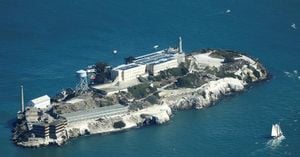On February 27, 2025, authorities confirmed the extradition of high-ranking cartel members Miguel Ángel Treviño Morales, known as Z-40, and his brother Óscar Omar Treviño Morales, or Z-42, from Mexico to the United States. This significant event was reported by the Webb County Sheriff's Office, which stated, "The extradition of two high-ranking cartel members, Miguel Angel Trevino-Morales (Z-40) and Oscar Omar Trevino-Morales (Z-42), was carried out on February 27, 2025." This marks the end of their time spent behind bars, which began after their arrests—Z-40 in 2013 and Z-42 in 2015.
The two brothers are considered pivotal figures within the notorious criminal organization known as Los Zetas, originally established as the armed wing of the Gulf Cartel before becoming independent. Known for their extreme violence and criminal activities, they currently face numerous charges including drug trafficking and money laundering.
The men's extradition was confirmed as concerns heightened over public safety, particularly for those visiting areas like Nuevo Laredo. Sheriff Martin Cuellar was one of the officials who warned residents, stating, "The Webb County Sheriff's Office is urging the public to exercise caution when visiting various parts of Tamaulipas, mainly Nuevo Laredo." He emphasized the real risk posed by the cartel, saying, "This cartel tends to respond with extreme violence against Mexican government entities, increasing risk for citizens in the area." Such warnings are echoed by the historical behavior of Los Zetas, known for retaliatory violence.
Prior to their extradition, the Treviño brothers were facing a myriad of legal challenges. The United States government had previously indicated allegations against them—asserting they maintained control over drug trafficking operations even from prison. A formal indictment from the US Department of Justice accused the two brothers of participating in “a continuing criminal enterprise, drug trafficking conspiracies, and using firearms.”
This extradition was finally set against the backdrop of significant legal maneuvers and reports of delays attributed to the Mexican judicial system. Just weeks before, the Federal Court for the District of Columbia had surfaced formal accusations against Z-40 and Z-42. These court proceedings had stalled due to various federal judges' determinations.
While officials celebrated the extraditions, the atmosphere remains tense as the region had previously faced violent upheaval following criminal arrests. Recent violence, triggered by the arrest of rival cartel members, showed the extreme lengths to which these organizations would go to maintain power.
Yet, the extradition itself was met with skepticism by some, especially legal representatives of Z-40. Juan Manuel Delgado, Z-40's attorney, stated during interviews, "A extradition would be impossible," reinforcing concerns over the legal processes involved. He emphasized the intricacies of the extradition process, noting the three phases required for it to be validated, indicating they were still within the judicial opinion phase but were suddenly announced as extradited by sheriff officials.
This sudden announcement raised eyebrows concerning the protocols officers had stated earlier—where Z-40 was reportedly still contesting the eligibility for extradition.
Notably, Z-40 is also facing accusations from separate jurisdictions, with allegations extending across Texas and New York, where he is charged with drug trafficking activities dating back several years. For his part, Z-42 has similar charges pending against him, showing the extensive network and operations the brothers are believed to have orchestrated over the years.
The Treviño brothers had previously used creative means to launder money from their drug trafficking, including the purchase of racehorses through associates living across the border. This underlines the far-reaching operations of Los Zetas and their continuous efforts to secure wealth acquired through illicit activities.
Now, as both brothers prepare for their court hearings in the US, the impact of their extradition could hold significant weight on future law enforcement strategies. Their capture and subsequent legal downfall shine light on the overarching issue posed by cross-border crime.
Extraditing key figures like Z-40 and Z-42 may provide some hope to Mexican officials and American law enforcement as they seek to dismantle the criminal enterprises plaguing both countries. Yet, without comprehensive measures to address the root causes of such violence, it’s uncertain whether this move will lead to long-lasting change.



